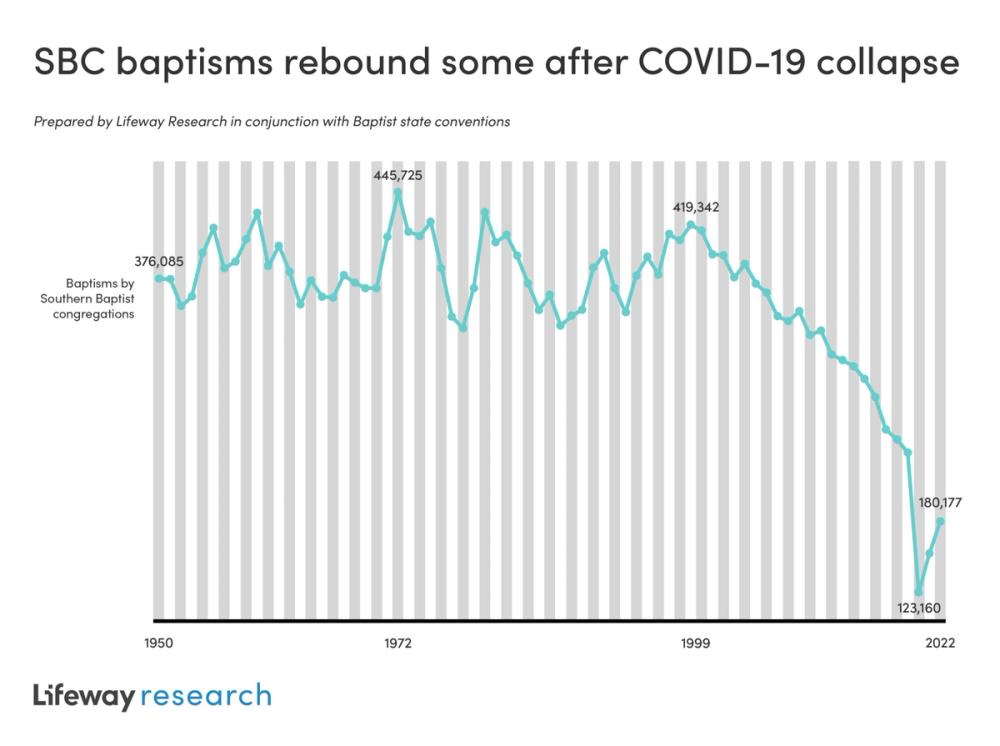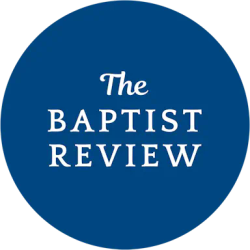The conservative resurgence did not work. The Cooperative Program is in its last season. And we are most known for our failures related to handling sexual abuse. The Southern Baptist Convention is in deep trouble. We are indeed a “contentious lot,” as the historian Leon McBeth noted many years ago. Unfortunately, our convention of contention is on a long, deep slide into irrelevance—or worse. How did we get here? We’re unraveling for three major reasons.
A True Conservative Resurgence Never Materialized
Baptisms in the Southern Baptist Convention peaked in 1972 at 445,725, right before the kickoff of the conservative resurgence. The takeover was completed in the mid-1990s when almost every SBC leadership position was filled by a conservative. We were told that the “primary benefit” of the conservative resurgence would be “an unprecedented evangelistic harvest in the denomination.” Instead, the opposite happened. Shortly after conservatives gained control in the mid-1990s, baptisms utterly collapsed. Consider this chart from Lifeway Research, chronicling the massive decline in baptisms over the last 30 years.

Since baptisms are a close proxy for evangelism in our tribe, the evidence is obvious. The conservative resurgence—if it was supposed to lead to Great Commission effectiveness—did not work. The battle cry of “evangelism” in the 1980s and 1990s was a mirage. As church researcher Ryan Burge has noted, “That math just ain’t mathing. No denomination can sustain losses like the SBC is experiencing and not be fundamentally changed.”
There is no doubt our convention was on a liberal trajectory decades ago. In 1970, a Baptist Sunday School Board poll revealed about 70% of Southern Baptist pastors supported abortion. Resolutions in the 1970s (1971, 1974) tried to find a “middle ground” on the abortion issue, allowing for abortion in some instances. We were on record as a pro-choice convention. The rank liberalism in some of our seminaries was a rot that had to be cut out. We needed change, and many people knew it, which is why the conservative resurgence took place.
But, when given the opportunity to include “inerrancy” in a new doctrinal statement, the word was left out. For twenty years, conservatives rallied behind the specific standard of inerrancy, and the word was pushed everywhere. Even today, most Southern Baptists assume it’s part of the Baptist Faith & Message 2000. It is not. The absence of inerrancy was “curious,” as Russell Dilday wrote in 2001, “since so much of the twenty year controversy centered on the use of the term ‘inerrant’ to describe the nature of the Bible, it was now apparently deemed unimportant.”
Are we more conservative following the resurgence? Absolutely, and for that I am grateful. But it is odd to me that the doctrinal battles are currently over tertiary issues–like the degrees to which we are complementarian–and nobody seems to care that we never clarified the issue of inerrancy. Additionally, countless SBC churches are in violation of the BFM2000 with their practices of the Lord’s Supper. Many practice open communion, like my church. We demand conformity on issues like women in ministry, but we don’t even agree on the doctrine and practice around the ordinance of the Lord’s Supper. Why does that matter? We can’t agree on how much we must agree.
The two major battle cries of the conservative resurgence were doctrine and mission—what we believe and how we cooperate. Yes, we are more conservative, but we are also less unified. Our fights have become more intense as they have become more nuanced—marked by more rancor over lesser issues. Additionally, the mission to do more evangelism never materialized. Instead, the opposite occurred. We are far less evangelistic now than when we were a moderate-leaning convention. In the midst of these failures and fault lines, another crisis looms. The aging Cooperative Program system is experiencing strains that will ultimately result in failure, if left unattended.
The Cooperative Program Is Well Past Its Prime
The Cooperative Program was born in “crisis,” or at least that’s the word used in the 1925 Annual to convince the messengers that “aggregating” funds was a preferable method over each institution appealing to churches individually for support. According to the “Commission on Future Program,” led by M. E. Dodd of Louisiana, these individual appeals would “in the end bring the greatest demoralization and disaster.” Hyperbole seems to be a longstanding rhetorical tactic of Southern Baptist leaders.
Overstatement aside, in the main Dodd was right, and the commission, frankly, genius in their approach to funding. Southern Baptist churches were booming at the time, and funds were lacking to train, equip, and send people. “We have really led in evangelism,” the commission reports, “but lagged in enlistment [of securing funds].” They were spreading the gospel on a shoestring budget. The newly formed Cooperative Program helped fuel the fire of evangelism, discipleship, and missions.
We are in a much different situation today. We have billions of dollars and non-existent evangelism. Dodd and the commission believed a “stabilized financial system will itself secure and attract large gifts.” In the 1925 Annual, they made plain that a critical part of funding is to secure large sums from the wealthy and redistribute this wealth among the causes of all Southern Baptists. Did this idea work for Southern Baptists in the coming decades? It did. Brilliantly so. While SBC leadership at the time encountered several hurdles in implementing the Cooperative Program, today approximately $450 million passes through the funding machine, quite an increase from the $4.1 million given in 1925.
But, like many systems that count on an aggregation model of funding, over time, inefficiencies have grown as funding has grown. The greatest strength of the model has become its greatest weakness. The aggregated funding mechanism was needed then. In 1925, Ford’s Model T was the best-selling car. Ten years earlier, the first transcontinental phone call occurred. Modern methods of transportation and communication were just beginning. Aggregating funds made sense because word traveled slowly. Our institutions required quick and stable funding; the best way to do that was through the Cooperative Program. The mighty tributary, as some like to call the Cooperative Program, provided a flow of funds for many worthwhile mission endeavors.
The Cooperative Program was a good vehicle for growth when the SBC was adding multitudes of people, but we are now in a state of severe decline. We’re over-structured, like the megachurch that built a 500,000-square-foot campus for 15,000 people but currently houses 1,500 worshipers weekly. We have too much infrastructure for too few people and minimal prospects for growth. The soon-to-be reality for the Executive Committee is a lack of funds, resulting in reduced allocations to our institutions, which will, in turn, cause some agencies to close. When will this happen? It’s tough to know precisely. But it will occur. And when it does, the mighty tributary will dry up as more churches revert to a societal model of giving. Many are already making this move. State conventions would be wise to prepare for this inevitability.
The Cooperative Program is like a giant deflating balloon. It will not pop suddenly but rather dissipate slowly. Every scandal and worrisome news report acts like another small prick in the balloon, causing it to deflate a little more quickly. When will people notice the air is gone? You can already see the signs of a strained system. Every SBC entity makes individual appeals in various ways, and I can’t blame them. They know, intuitively or strategically, that the cooperative model is dying. Whether we like it or not, a hybrid societal model is in our future. The six seminaries will be the real test of whatever societal model emerges from the ashes of the Cooperative Program. The ones that survive will be the first to figure out revenue models not dependent on cooperative funds.
It’s not 1925 anymore. We don’t need to keep driving our Model T Ford. Yes, the engine still works. But we need a new vehicle. If the rallying cry is still “evangelism and missions,” it’s time to trade in the old model that has served us well and get a new one to drive us into the future.
The Horrid Injustice of Systemic Sexual Abuse
The most baffling part of the SBC right now is the silence of our leaders concerning the systemic issue of sexual abuse. Our Convention has been plagued by predators, and many seem to keep on operating as if nothing has occurred—or as if a few minor tweaks will get us back to what we would rather be doing. During the conservative resurgence, we fought battles over doctrine, and the spoils of war went to power barons who lacked integrity. We’ve worshiped doctrinal heroes for forty years and did not ask enough questions about their character. We assumed they were right in the heart since they were right in the head. Some of them were neither. Now we’re reaping what we’ve sown.
Why are there no instituted reforms with such clear-cut evidence of widespread abuse? One problem that is not getting enough attention is what is inherent to the entire system. The money keeps flowing from the tributary, with or without reforms. Top leaders feel no pressure to be transparent because the money will flow regardless. The trustee system is broken and has been for quite some time. Financial disclosures are lacking, and SBC entity leaders have worked hard to keep even the most basic non-profit filing–Form 990–from happening. Because of this, there is great difficulty with a bottom-up reform effort. Since the issues are systemic, the most successful reforms must be a top-down effort. But those at the top benefit from the system, so they fight any reform effort from those at the bottom. Without quick work, this issue will deflate us faster than anything else.
Listen to the messaging after each crisis and scandal. Many will pump the idea that restitution for victims will bankrupt the system, forgetting that our systems should protect individuals. It’s all backward. Most top leaders understand we are on the brink of collapse, but pushes for transparency are eschewed. What could be uncovered that will make the system unravel even more quickly? The only things that distribute faster than Cooperative Program funds are lawsuits and amicus briefs. Do we share the same speed of response for reforms as we do to defend ourselves?
Never forget that so many of these horrors were committed by our leaders! They raped children and covered it up. They abused women and wanted to break them down. May God bankrupt our finances to bring us to a place of spiritual bankruptcy. We should have spent our time and energy hunting wolves instead of guarding institutions. Instead, we ignored those victimized by pedophiles, predators, and abusers. Even now, the echo chamber of Southern Baptist leadership is slow to decry or even discuss the evil of Pressler and others. Justice seems to have become a rare commodity in SBC circles.
If justice for individuals requires the system’s bankruptcy, so be it. What we need now is some 1925 hyperbole. We’re in a crisis! Let’s fix it! What we have from our leaders is silence and status quo.
Who is the next M. E. Dodd?
Editor's Note: As a part of its commitment to fostering conversation within the Southern Baptist Convention, the Baptist Review may publish editorials that espouse viewpoints that are not necessarily shared by the TBR team or other contributors. We welcome submissions for responses and rebuttals to any editorials as we seek to host meaningful conversations about the present and future of our convention.


